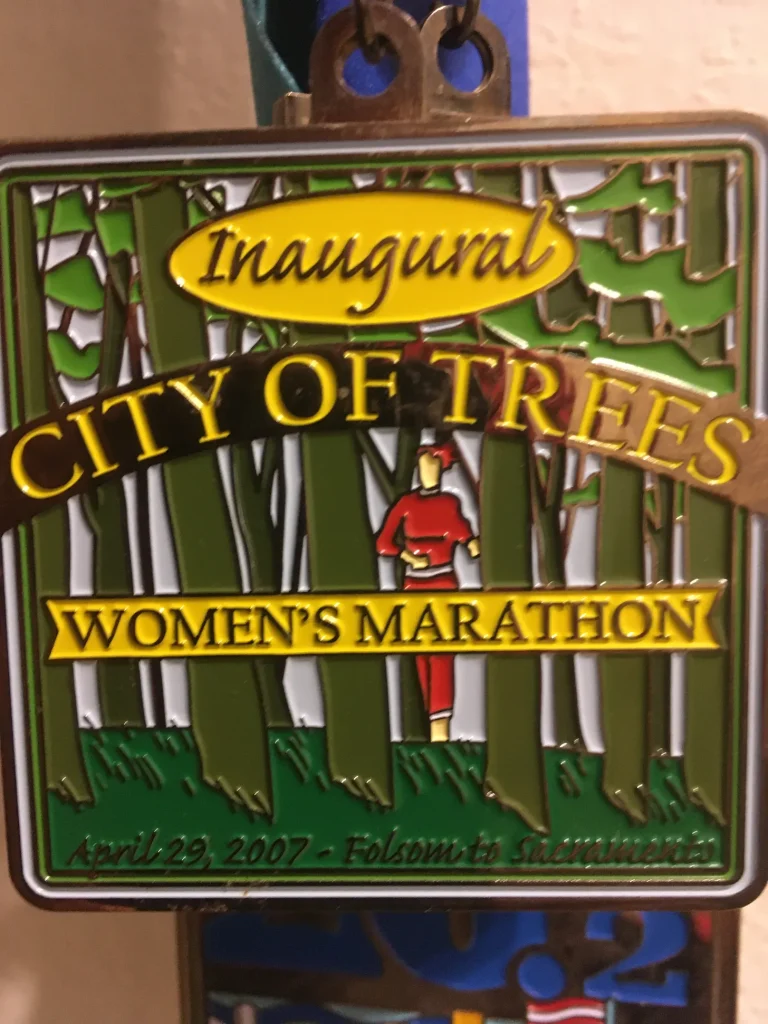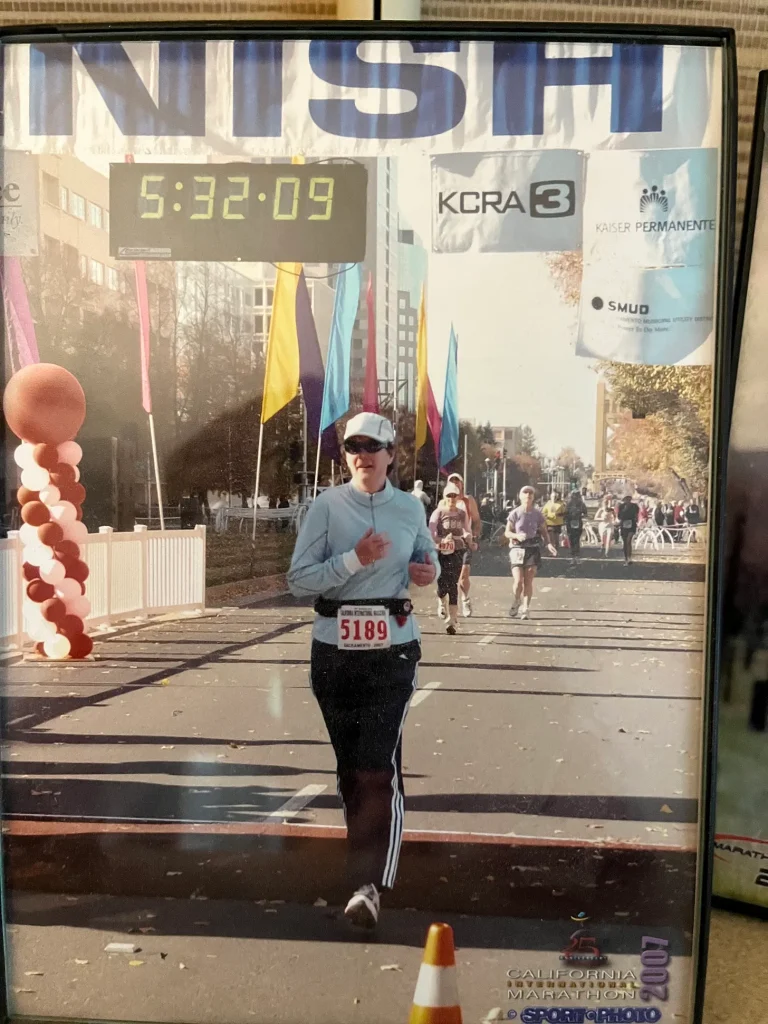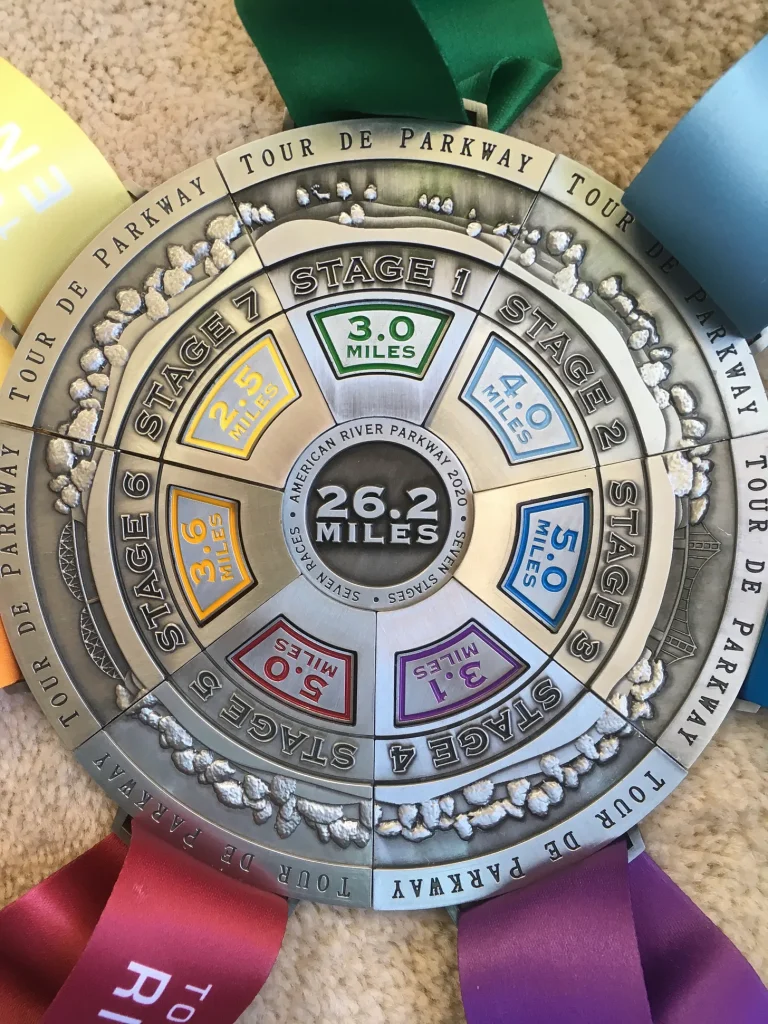How to Become a Runner (or Anything Else You Dream of)
Back in another life, I was a single mother of two kids (married to a mostly absent husband), a full-time college professor, a writer, an independent publisher. While I was keeping all those plates in the air, in the space of a handful of years my father died, my husband moved out, my father-in-law died, my now-ex-husband died, my son almost died. Life was an unrelenting whirlwind of obligations, loss and turmoil.
During the day, from 7 until about 4, I taught foreign languages at the local community college. Then I’d rush home, change my clothes, and head down the hall to my dark little office (our 4th bedroom), and resume working as executor of the estates that had become my responsibility (my husband’s and my father’s). Three small houses on the east coast needed to be remodeled, two in California (where I was living). Without a spare moment in any day, there was no time to go out and find help with any of it. I wrote the estate documents. I made all the decisions.
At 11:00 p.m or so or later, when I could no longer see or function at my desk, I would take our large malemute, Juno, out for a stride through the dark neighborhood. We both needed it — her for the exercise, me to clear my head of the non-stop demands that were my life, 24/7. It was small comfort, since I knew it would all start again at 5:30 the next morning; but it was something, a bit of release. A clearing of cobwebs.
Juno’s long, powerful Alaskan sled-dog legs pulled me along, and jogging was the only way for me to keep up with her. I knew I couldn’t run, given my history of unrelenting non-stop second-hand smoke as I grew up — but during those night jogs my mind focused on all the problems I had just dealt with in my little office…choosing carpets for the Pennsylvania houses, fixtures for the west coast house, hiring contractors, buying washing machines or heating systems or dealing with the city, county, the morgue…. My feet tried to keep up with the dog, but my mind was locked in to solving problems.
One night I raced back into my house around 11pm, breathless with disbelief, and called for my son, who was home stocking up for another climbing expedition.
“Alex,” I shouted as soon as I recovered enough breath, “I just ran a mile!”
An outrageous statement for me! As a kid, I’d always had to wave away the clouds from my father’s cigars and my mother’s cigarettes (people didn’t know anything about second-hand smoke, yet). I huffed and puffed just getting up from my chair. I had accepted that I couldn’t run, or swim, or do anything that required sustained deep breathing.
But I’d just run a mile!

His reply changed my life.
“Cool, Mom.” he said with a shrug. “If you can do a mile, you can do a mile and a half.” And he turned and went back down the hall.
Deflated as I was, I found his logic unassailable.
Several evenings later, I ran back home and announced, “Juno and I just ran a mile and a half!”
“Cool.” Another shrug. “If you can do a mile and a half, you can do two.”
You get the rhythm.
My daughter is a runner. She’s crazy about it, and gets crazy if she can’t do it for a while. But she and her brother were in their twenties then.
I wasn’t.
When I reached three miles, I started exploring online. What did runners really do? I knew the county closed down streets now and then to accommodate them. That was about all I knew.
Then I saw an ad for the Run to Feed the Hungry, to help the local food bank for Thanksgiving. 6.2 miles (10K) sounded impossibly far! Sure, I ran around the neighborhood with the dog, occasionally slowing to a walk, but 6 miles? Six miles!
But even if I didn’t finish, it was for a good cause that I was happy to support. So I paid my money and signed up.
Juno and I ran every evening, and once in a while, I’d go running and leave her home (she stopped a lot, and I didn’t have time to train her out of that habit). I ran in jeans and sweatshirts; I knew nothing yet about ‘real’ runners. Teaching took more than full-time hours (I always had overload classes), and the very messy estate work from the two estates took even more hours than the teaching. A second full-time job, complicated by tons of emotions. No time for grieving. Every moment of my day was spoken for. I had no time for this. I squeezed it in anyway. Running became my escape.
Alex was going to Spain for a climbing competition, and returning the evening before the run. But when I mentioned that I’d signed up for it, he said “Sign me up, too.”
Really? The morning after a 12-hour transatlantic flight? I would have been a zombie. But he seemed sure, so I signed him up.
Thanksgiving morning. I put on my jeans, my T-shirt, flannel shirt and big white sneakers (I really didn’t know anything about running!). I woke Alex, who had slept in his clothes after his very-late-night arrival, and off we went to my very first road race!
I had grave misgivings when I saw the huge crowd assembled at the Start. Thousands of people! Tens of thousands, I read later. High-energy, running types, in their Spandex and turkey costumes — all clearly better informed and prepared than I was!
Trepidation battled with excitement as the gun went off! It was unlike anything I’d ever experienced. All those people, just trying to be better, to meet a goal! Out there to help people, by the thousands, single-minded and having a blast.
For me, it was anything but fun. I gasped, struggling to breathe. It was all new — the jostling crowd, the bands playing to cheer us on, the crowds of onlookers, the Porta-Potties — I’d never done anything physically competitive in my life. I was out of my element.
Alex ran alongside me, and told me about Spain, and his competition. As I gasped for air, trying to ignore the pain (it was a lot harder than just running around my little neighborhood), he talked about his adventures. I couldn’t imagine how he could breathe enough to talk while running! His tales were fascinating. He entertained me with descriptions and anecdotes as he ran backwards in front of me, alongside me, in circles around me, occasionally zigging or zagging up someone’s lawn.
He became my single focus as I forced myself to keep going. When I knew I couldn’t manage one more step, I’d look at Alex and try to picture him having the adventures he was relating. When I needed to stop, he stopped with me, carried my sweaty shirt, kept up his recounting of the week before. I made myself focus on his words.
When we passed the halfway mark, I still didn’t think I’d finish. I can’t count how many times I might have stopped, had my attention not been on Alex’s stories rather than my physical misery. I couldn’t breathe enough. My feet hurt. My knee hurt. I was too hot. The waistband of my jeans was digging into my sweat-moistened, irritated skin. My sunglasses kept sliding down my nose. This wasn’t fun.
Somewhere between the fourth and fifth mile, something changed. I still followed his stories, still couldn’t breathe. But my own footfall began to replace his voice. I listened to it instead of my ragged breathing. Suddenly, with a clarity I’d never felt before, I knew I’d finish.

When I glimpsed the finish line, several blocks ahead, I realized my life had just taken a sudden turn. I had no idea where it was going to lead, but I knew there was no going back. I was a runner. I’d have to buy some real runner’s clothes, some good shoes. There was probably — certainly — lots more I needed to know. But I’d just learned the most important thing — I could do this!
Who knew what else I could do?
I’ll never know for sure whether I would have finished if I hadn’t had Alex’s voice to follow the whole 6.2 miles. Maybe the stubbornness — or is it tenacity? — I’ve since discovered as a rock climber would have surfaced and saved the day? I’ll never know.
But I’ll always be grateful for that voice — and the wisdom that came with it.
If I could do one mile, I could do one and a half. Or maybe just one more block. Just as far as that little park on the corner. Up to that traffic light.
Baby steps became my mantra. Of course, the concept of proceeding by baby steps is nothing new. As the French have said for centuries, Petit à petit, l’oiseau fait son nid. (Little by little, the bird makes its nest.) One tiny twig at a time. One baby step each day.
But — and this is the big caveat that leads so many dreamers into frustration instead of accomplishment — just breaking your goal down into baby steps is not enough.
Here’s the real key:
How you organize those baby steps is what determines whether your dream becomes reality. That supersedes everything else, even the most dogged determination. In up-coming thoughtletters, we’ll explore what that structure consists of, and how it can help you accomplish anything your heart dreams of.
See you there.

© Copyright 2025 Dierdre Wolownick All Rights Reserved.